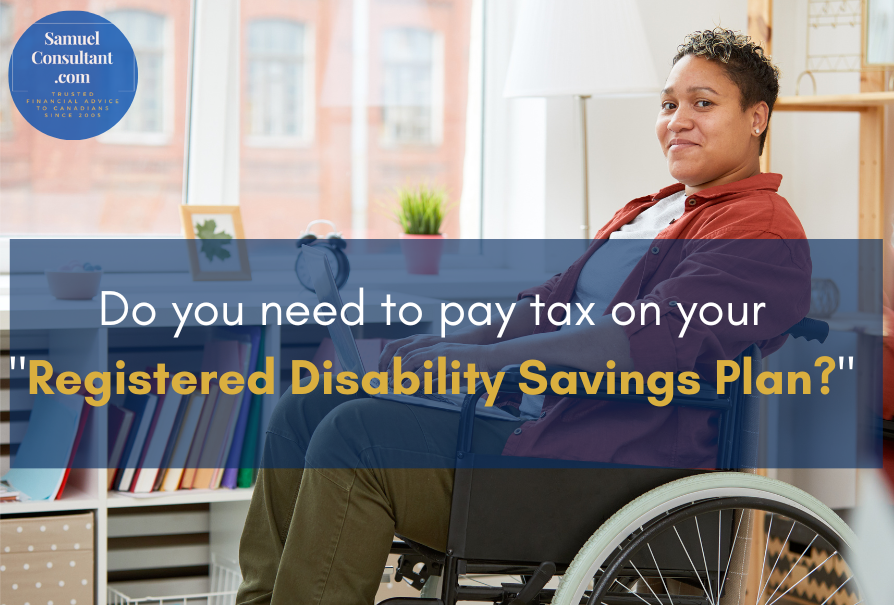I regularly receive inquiries from families with disabilities about whether they need to report tax on their Registered Disability Savings Plan (RDSP), especially during tax season. Given the confusion around this topic, I decided to write a bit on this topic and hopefully could help shed some light on it.
But before we dive in, I want to remind that this post is for general understanding. So it’s better to discuss your specific circumstances with an accountant.
So do you need to report tax for your RDSP? Well, the answer is – it depends!
Let me explain it to you in simple terms. When you have an RDSP and you don’t withdraw any money, you don’t need to report tax yet. But, if you do withdraw money, there will be tax implications.
The money you withdraw from your RDSP will consist of three parts:
- Your contributions
- Investment growth
- Canada Disability Savings Grants or Bonds
The good news is that your contributions are non-taxable. That means you don’t have to pay tax on the money you put into your RDSP.
However, the other two parts – investment growth and Canada Disability Savings Grants or Bonds – are taxable. This means that when you withdraw money from your RDSP, you will have to pay tax on these amounts.
To give you a better idea of how to report your RDSP income when you file your taxes, here’s what I found on the Government of Canada website.
“Line 12500 – Registered disability savings plan income
If you have received income from an RDSP in 2022, enter the amount shown in box 131 of your T4A slips. For more information, see the Registered Disability Savings Plan (RDSP).
Note
The RDSP income you report will not be included in the calculation of your GST/HST credit, your Canada child benefit (CCB) payments, the social benefits repayment (line 23500), the refundable medical expense supplement (line 45200), or the Canada workers benefit (CWB) (line 45300).”
Quote from the Canada.ca – Registered disability savings plan income
It’s important to note that the financial institution that administers your RDSP will provide you with a tax slip, such as a T4A, that shows the amount of RDSP income you received during the year. Make sure you use this information when you file your taxes.
So, to sum it up – if you have an RDSP and you don’t withdraw any money, you don’t need to report tax yet. But if you do withdraw money, you will need to pay tax on the investment growth and Canada Disability Savings Grants or Bonds.
I hope this explanation has helped you understand how RDSP income is taxed.
Stay informed with our e-newsletter, where I share regular financial updates tailored specifically for Canadians with disabilities. Subscribe to stay ahead with financial insights that matter to you.
Disclaimer:
The comments contained herein are a general discussion of certain issues intended as general information only and should not be relied upon as investment, financial, legal, accounting or tax advice. Please obtain independent professional advice, in the context of your particular circumstances. This newsletter was written, designed and produced by Samuel Li for the benefit of Samuel who is Advisors at : SamuelConsultant.com is a registered trade name with Investia Financial Services Inc., and does not necessarily reflect the opinion of Investia Financial Services Inc. The information contained in this article comes from sources we believe reliable, but we cannot guarantee its accuracy or reliability. The opinions expressed are based on an analysis and interpretation dating from the date of publication and are subject to change without notice. Furthermore, they do not constitute an offer or solicitation to buy or sell any securities.
Mutual Funds, approved exempt market products and/or exchange traded funds are offered through Investia Financial Services Inc.
Commissions, trailing commissions, management fees and expenses all may be associated with mutual fund investments. Please read the simplified prospectus before investing. Mutual funds are not guaranteed and are not covered by the Canada Deposit Insurance Corporation or by any other government deposit insurer. There can be no assurances that the fund will be able to maintain its net asset value per security at a constant amount or that the full amount of your investment in the fund will be returned to you. Fund values change frequently and past performance may not be repeated. Investia is not liable and/or responsible for any non mutual fund related business and/or services.

